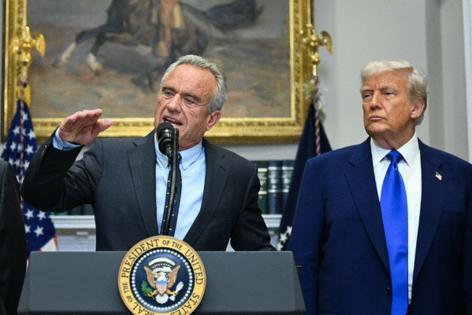Trump signs order to level US drug prices with other countries
Published in News & Features
WASHINGTON — President Donald Trump on Monday signed an executive order that seeks to bring the price of drugs in the United States in line with what other countries pay.
The policy, known as most-favored-nation status, is intended to drive drug companies to lower prices domestically while other countries shoulder more of the cost. White House officials said Monday this policy seeks to make the global pharmaceutical market more competitive and encourage other countries to contribute to the cost of drug innovation.
Trump attempted to implement the policy within Medicare Part B during his first term, but the plan was ultimately blocked during the Biden administration. Officials said the policy announced Monday is broader and extends to the commercial market.
Other countries often have lower prices for the same drugs compared to the United States, with a big factor being the negotiating power of foreign government health systems.
“Starting today, the United States will no longer subsidize the health care of foreign countries, which is what we were doing,” Trump said at a news conference Monday morning.
In a Truth Social post Sunday evening, Trump claimed that the policy would immediately reduce the price of prescription drugs by between 30% and 80%, while prices in the rest of the world will “equalize.”
“Our Country will finally be treated fairly, and our citizens Healthcare Costs will be reduced by numbers never even thought of before,” Trump wrote. “Additionally, on top of everything else the United States will save TRILLIONS OF DOLLARS.”
Trump hinted that he wants Republicans in Congress to use the policy as a starting point to work on health care reform that’s “much better than Obamacare.”
The order spells out numerous actions for agencies and officials to set the policy into effect.
A section titled “Addressing Foreign Nations Freeloading on American-Financed Innovation,” directs the U.S. trade representative and the Department of Commerce to take “all necessary and appropriate action” against other countries for actions such as suppressing prices below fair market value. Commerce is also instructed to consider how export restrictions fuel lower prices abroad.
The order also directs the Health and Human Services secretary to facilitate direct-to-consumer sales at most-favored-nation pricing and set targets for drug price reductions across all U.S. markets.
The Department of Justice and the Federal Trade Commission are instructed to target “anti-competitive” actions that keep prices high in the United States. It would also direct the Food and Drug Administration to expand drug importation from other countries beyond Canada.
If adequate progress isn’t made toward lowering prices, the Trump administration will implement most-favored-nation pricing via rulemaking, the order says.
“I have a couple of kids who are Democrats, are big Bernie Sanders fans, and when I told them that this was going to happen, they had tears in their eyes,” Health and Human Services Secretary Robert F. Kennedy Jr. said Monday at a news conference.
White House officials said on a press call that the order doesn’t target any particular drugs or class of drugs, but will prioritize those where there’s the largest gap between U.S. and foreign prices.
They said that the policy will likely target GLP-1s — popular diabetes and obesity drugs — which can cost more than $1,000 per month without insurance coverage.
Senate Finance Committee ranking member Ron Wyden, D-Ore., scoffed at Trump’s order, saying in a statement that “If Trump was serious about lowering drug prices, he would work with Congress to strengthen Medicare drug price negotiations, not just sign a piece of paper.”
Stephen J. Ubl, CEO of pharmaceutical lobby group PhRMA, said in a statement that the administration is right to use its negotiating power to force other countries to pay their fair share for the benefits of U.S. innovation. But he appeared to push back on the notion that U.S. prices should be lowered based on what other countries pay.
“Importing foreign prices from socialist countries would be a bad deal for American patients and workers,” he said. “It would mean less treatments and cures and would jeopardize the hundreds of billions our member companies are planning to invest in America — threatening jobs, hurting our economy and making us more reliant on China for innovative medicines.”
Critics of the policy argue that loopholes available to other countries mean the policy won’t ultimately lower prices.
University of Southern California economists Darius Lakdawalla and Dana Goldman say that other countries often negotiate confidential rebates with drug companies that undermine the higher “list” prices.
“Facing a choice between deep cuts in their U.S. pricing or the loss of weakly profitable overseas markets, we can expect many firms to pull out from overseas markets at their earliest opportunity, leaving U.S. consumers with the same prices, pharmaceutical manufacturers with lower profits, and future generations with less innovation,” they said last month in an op-ed in STAT. “In sum, everyone loses.”
©2025 CQ-Roll Call, Inc., All Rights Reserved. Visit cqrollcall.com. Distributed by Tribune Content Agency, LLC.







Comments